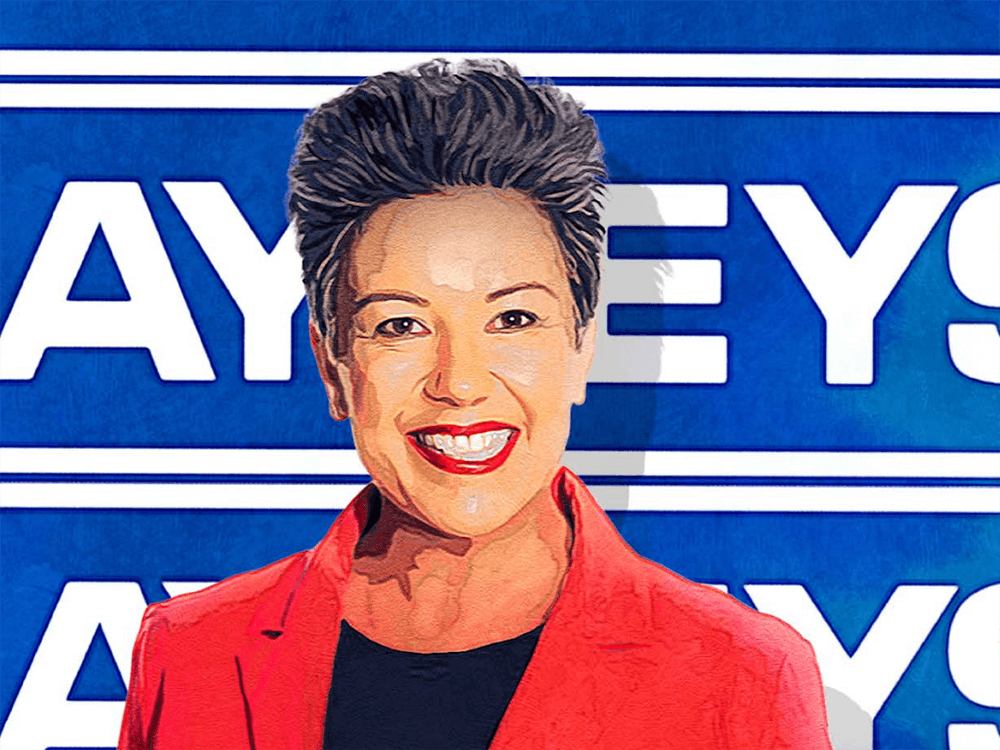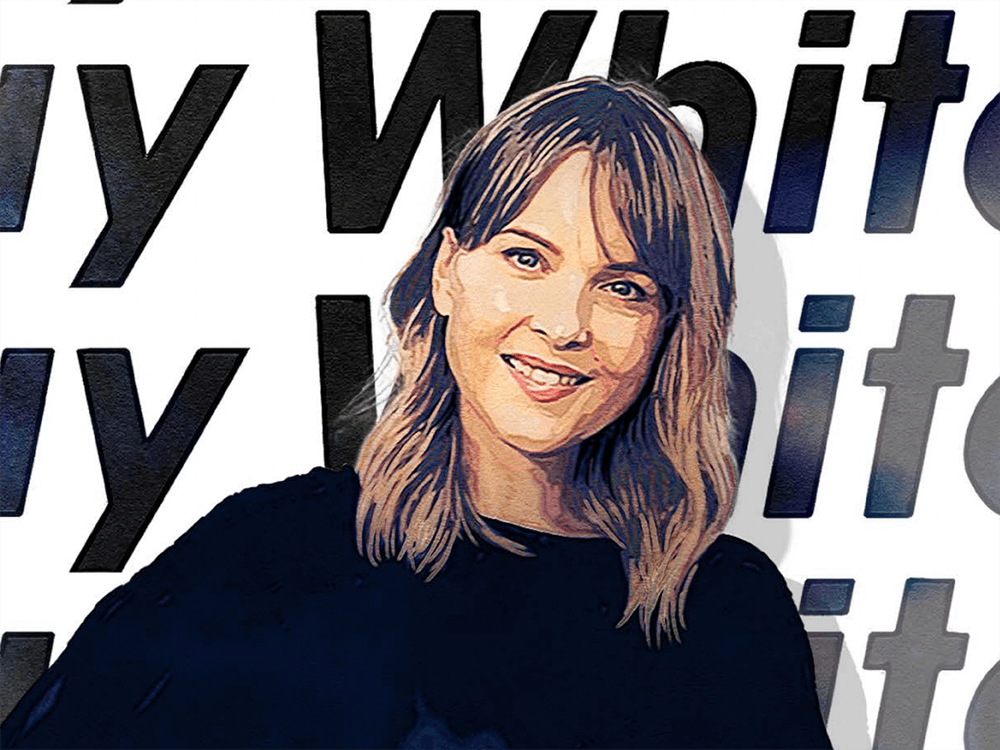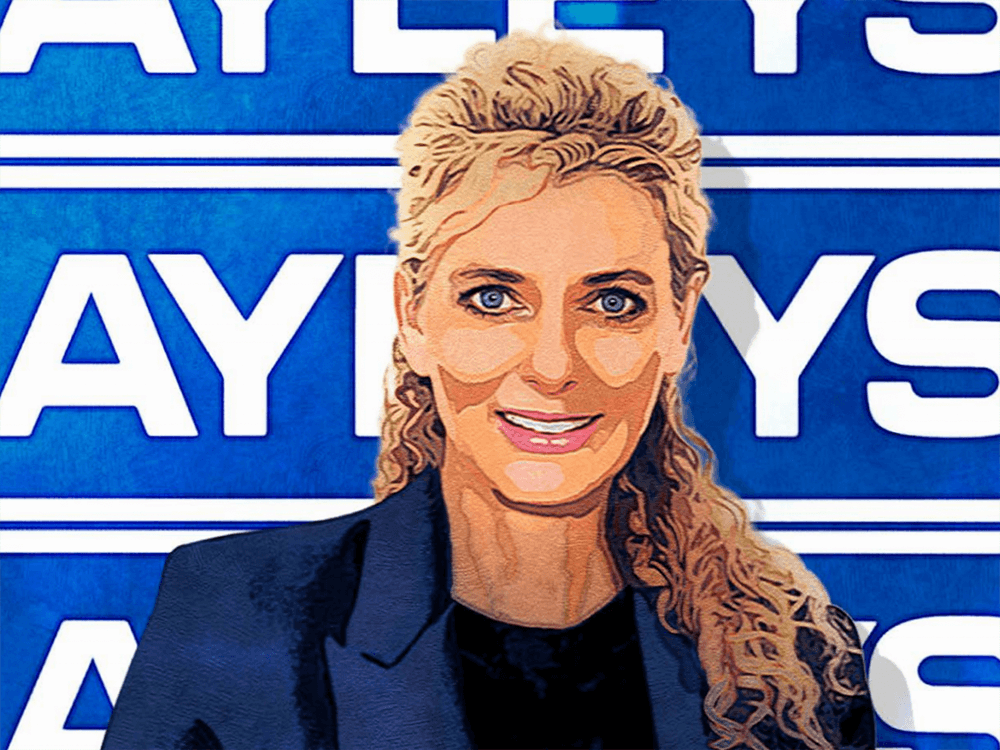May 24, 2021 Society
New Zealand celebrities are becoming real estate agents. Metro follows Sally Ridge, Paula Bennett and Angela Bloomfield to find out why.
Sally Ridge and I are in Bambina, our long blacks sitting untouched before us, looking at Instagram together. “Her page is really good,” she says, tapping into another window of Angela Bloomfield’s page, showing an auction in Glenfield. In real estate, as in show business, image is everything.
This is one of many bromides I absorb while talking to Ridge, the former reality-TV presenter who’s famous for being famous, to former deputy prime minister Paula Bennett and to long-time television actor Bloomfield, who have all swapped different brands of stardom for the allure of selling property. Ridge calls the transition a “no-brainer” for many high-profile New Zealand figures, and the drama (what some might call a crisis, a bubble or, gulp, the future) of real estate is one she knows intimately: “I love to do a good job for the vendor, and to get an amazing sale, but it’s also a passion because I love property.”
The New Zealand dream is up for sale; the graduation of celebrities from reality television to realty advances the myth of homeownership as the pinnacle of success, our nation’s stars inviting us to own our own slice of paradise, just like them.
It’s a paradise Bloomfield is also looking to invite you into. “You can turn it into a house like in the magazines,” she promises, speaking to me, or perhaps to herself, as we walk through a Glenfield bungalow on a hot afternoon in January, her cameraman trailing us, drone in hand.
Bloomfield (“Ange” to her friends and clients) has made the bungalow her first stop of the day on behalf of homeowner Jacinta, who found being a landlord a messy business (quite literally — the tenants’ children drew in green paint all over her walls) so is looking to sell. She has been awed by Bloomfield’s devotion to going the extra mile: “Ange has been amazing,” she says. “‘I’ll scrub that off, I’ve got cushions you can borrow, I’ve got rugs’ — but I think she’d do that for anyone.”
Real estate wasn’t always the plan for Bloomfield. Under the spectre of Covid, she was forced, like many of us, to improvise. In early 2020, acting and directing projects were brewing, “and then, Covid happened”, she says. “One of the shows disappeared abruptly and one hung on to the bitter end … and then disappeared.” By September, she had started studying for her real estate licence.
Shortland Street was part of Bloomfield’s life for 22 years, mostly as Rachel McKenna, whose storylines of alcoholism, mental health, sexual abuse and medical misconduct titillated the nation, but also as a director. By comparison, real estate, even in this market, is a breeze: “When you’re a real estate agent, the market is the market, but the process is the same.”
When we first meet, Bloomfield is jubilant — she has just made a sale, the buyer is coming to sign that afternoon (“This is the part that’s quite similar, the drama”). Before then, she has two properties to visit, stagings to do, a promotional video to shoot, my questions to contend with. Bloomfield is doing her best to make hay while the sun shines: “You don’t earn money quickly in real estate; you’re still a self-employed person.” We progress to a villa, also in Glenfield, to shoot a promotional video. Despite having left the Street, most days Bloomfield can still find herself on a set, peering down the camera, rehearsing lines, selling a story. “I find them fun — that’s my wheelhouse, especially the ones with lots of people in them; they’re like short films!”
Across the street, standing on the lip of the kerb, an old man in a bucket hat and cargo shorts absorbs the spectacle. Bloomfield is liaising with colleague Ali Hellesoe. “There you go, there’s your script; have you got your mic on?” she says, sharing her script, which she has jotted onto a branded note-pad (“This is a quintessential family home … It even has a pool!”, it reads). She finds a corner out of the midday sun, then steers the cameraman to an angle that flatters them and the pool.
Bloomfield wondered at first whether Rachel would follow her: “Is this gonna be a burden? Is the ‘I want to list my house with the girl off the TV’ thing going to be… a thing?” Since then, she has found a sense of relief in playing herself; where billboards used to portend the fates and follies of Rachel, they now show Angela Bloomfield, beaming for Ray White realty: “It’s like — you don’t need to look at me anymore, look at this!”
Being famous is being a brand, and being a real estate agent is making a commission on that brand. Sally Ridge knows this well, and she loves it: “I just love property, so it was a no-brainer for me to get into real estate.”
If real estate has been Ridge’s calling card, it has also been a boon to Bayleys. Each auction is attended by “Sally Ridge tourists”. Ridge, mostly, finds the audience quite sweet: “People are very engaging and they like to know, ‘How long have you been doing real estate? Are you still doing interior design? How are the kids? How old is Jaime now?’ Which is nice. It’s a nice way to meet new people — and to sell off a beautiful home.”
As real estate agents, those used to being watched get to watch their audience instead, and to watch our national story unfold. “Every Kiwi wants to buy a house and build it up,” Ridge says. “That’s the mentality of a Kiwi — to buy a house and make it their own.”
The website for Bayleys, where Ridge has worked since 2016, vaunts her interior design style and describes how she has “seen the landscape of Auckland property change dramatically over the past decade”.
Quite. But that drama is quickly turning into a tragedy, as Auckland has become a city wracked by the lowest rates of homeownership in a generation, and where the median house price is 10 times the median household income. In the year to January, the median house price in Auckland rose 14.9%. New Zealand now has the highest rate of homelessness in the OECD. As Ridge succinctly puts it: “The market has gone crazy.”
I ask Ridge what she makes of the crisis. “It is what it is,” she says, resolutely.
I ask Bloomfield what she makes of the crisis. “It is what it is,” she says, wistfully.
To those in real estate, I find, the property market is spoken of as a kind of destiny. At Ray White’s Christmas party, Bloomfield wondered out loud what 2021 might have in store, whether the paradigm might shift. Could the would bubble burst? She learned, quite quickly, that in the same superstitious way that actors rehearsing Macbeth call it “The Scottish Play”, real estate agents don’t talk about the market.
But Bloomfield still abides by the New Zealand dream: “I bumped into a couple who were going to move out of town, and my heart just sank,” she says. “I’m Auckland born and bred, and at the end of the day, I want anyone who was born in Auckland to be able to live in Auckland, if that’s what they desire. I know it’s not a right to purchase a house, but if you step back and look at the traditional functioning of things, we should all be able to experience that. We should all be able to get a job, work hard, save some money, buy a house.”

“What real estate has done … is completely unleash me,” Paula Bennett says over a flat white (but no panini) at Bayleys’ sprawling Auckland offices in Wynyard Quarter. She was never a political wallflower during her 15 years in Parliament, so what can we expect from this new chapter in her life, as Bayleys’ director of commercial strategy? “I have a lot of friends in politics who have exited too early, and all they wanna do is go back,” she says. “They just feel unfulfilled and like they’ve never really reached their potential. Whereas I’m pretty lucky, in the sense that, you know, I became the deputy prime minister of this country. I never mourned it.”
Instead, Bennett dived straight into real estate, starting her new role two days after general election in October 2020: “I was lucky in that I was genuinely ready. I don’t have a moment’s regret in all the time I did, including in opposition. I think it grew me as a person.”
Like Bloomfield playing Rachel, Bennett has been playing Paula Bennett, MP, for some time: “In that world I felt that I had been so restricted for so long. [People saying] ‘You’re out for lunch? Well, you know, I’m paying your wage, get back to work, girlie!’”
And like in politics, Bennett seems to thrive on deal-making. “That’s why I had to go commercial [as opposed to residential] because there’s more mongrel in me, there’s more Westie.”
I ask Bennett what she makes of the crisis: “Most of us grew up with the ambition that we buy our own homes,” she says. “I know that when I was minister of social housing, we were thinking, ‘How can we help people find a job or parent more effectively if they’re worried about where they’re sleeping tonight?’ So there’s an absolute fundamental of it, and then there’s this innate Kiwi quarter-acre dream. Whether it’s now a two-bedroom apartment, or a quarter-acre.”
While we might hope the spectre of crisis could be the engine of innovation (“crisis”, after all, comes from the ancient Greek κρίσις, “a power of distinguishing, decision, choice, election”), successive governments, including National-led administrations Bennett was part of, have balanced the social pitfalls of the housing crisis with the economic benefits for the majority of those people most likely to vote (and, it must be said, the vast majority of MPs, many of whom own multiple properties). That’s a generational balancing act that at some point has to falter.
“You do have to work towards it,” Bennett insists. “And there’s a step before you get to where you’re gonna go, and I do see that less and less with the younger generation, that there’s an expectation that, ‘I’m gonna buy in Freemans Bay.’ Well, you might have been able to do that 20 years ago, but, you know, I can’t buy in Freemans Bay! But I also don’t deny that it’s just getting harder and harder for people as well.”
While Bennett tried to minimise concerns about housing affordability, it’s not up to real estate agents to end the property crisis. They know all too well the hysteria has to end at some point. As with the tech bubble in Silicon Valley — indeed, as with any bubble anywhere — the growth happens at such a speed that it’s impossible to take stock of the culture it’s replacing. The crisis has outpaced any efforts to quell it. And yet the longer you leave a problem, as anyone with a sore tooth can attest, the worse it gets. As a city, we have all left going to the dentist a little too late. The housing shortage grew into a problem, the problem grew into a crisis, the crisis grew into our reality. Like with our public transport, like with our waterways, like with our child poverty, the longer we stall finding solutions, the worse it continues to get.

Graduating from reality television, politics and Shortland Street, Ridge, Bennett and Bloomfield have been able to spin their cultural capital into commission, quite literally opening doors by projecting a persona that New Zealanders feel familiar with. As Ridge’s business partner, Dan Reed, says: “Sally’s profile is great for us. People already feel like they know her and they feel quite comfortable, and they know her experience as well. Sally is very, very good with buyers — like a dog with a bone, if she sees that potential. She’s very tenacious like that.”
Watching stars transition to real estate is a narrative pivot we have come to understand, and perhaps may come to expect, the perfect extension of our neoliberal bubble, the media realm as a marketing device for the economic imperative.
It helps that each of these women plays the game well. Bloomfield’s style as an agent is that of an accommodating friend, the one who would pick you up from the airport, or water your plants while you’re on holiday. In the tough real estate industry, her homespun style seems virtuous, and borderline out of place. Ridge’s style is her distinct brand of bare-faced chic — sourcing the perfect alpaca throw, or using an adroit touch-up of pistachio-coloured paint. Bennett’s style is Paula Bennett. I would buy property from all of them. I want Ridge’s calculation, Bloomfield’s bonhomie, Bennett’s wedding-celebrant energy. If only I could afford it.
I worry that the reason we have deep-seated trust for women as real estate agents entrenches deeply the old sexist cliché of women as the ultimate home-makers. Bloomfield, though, is relieved. In this respect, real estate makes a nice change from the entertainment industry: “In real estate, it’s okay to be old, and it’s okay to be a woman. In fact, they say that mothers make the best real estate agents. So this is like, Hallelujah! I’m older, which means people at open homes trust me.”
Bennett is not fazed by gender issues either: “Commercial real estate is a male-dominated field … But, look, I grew up with brothers, so men are easy!” She laughs, heartily. “Men are easy!”
There is a totality of engagement in real estate across the city — this trend just marks the extension of New Zealand’s real estate industrial complex. The wattage of star power adds to the glow of a new listing. Marketing experts describe the transferred association of imagery to people as “meaning transfer”, meaning the set of images that come to mind when you think about ABBA are different from those when you think about Metallica. It’s for this reason that a billboard of smiling TV presenter-turned-real estate agent Jayne Kiely elicits feelings of trust and goodwill.
Property, as viewing figures for The Block or The Project can attest, is now a national obsession. Go to any middle-class dinner party and you’re more likely to be subjected to conversations about house prices than local television or even the All Blacks. Most of my friends could summon the loan-to-deposit ratio, but not the number of New Zealand children living in poverty; they could tell me the latest home-loan interest rates, but not the disproportionate percentage of Māori imprisoned. And our politicians, actors and athletes transitioning to real estate illustrates an impulse to sell ourselves on our own good fortune, on our own (increasingly elusive) kind of manifest destiny.
Yet, the obsession persists; something Bennett, Ridge and Bloomfield all acknowledged in our conversations. We discuss the crisis like it is an inevitable natural disaster, not the result of a society obsessed with the nuclear family, home ownership and the couple unit. In the city of the eternal Briscoes special, it has felt, lately, that everything is for sale. Yet the winners of the media and property landscape are always the same. Bennett, for example, is now able to make a living out of the very crisis she once denied existed. Meanwhile, Labour’s lack of solutions, lack of social housing and lack of willpower to make the tough decisions mean change is unlikely to occur. At present in the city, little else can be heard over the din of auctions.
During my time with Bennett, Ridge and Bloomfield, a poem by Maggie Smith ran through my mind. Good Bones went viral in 2017, as a timely riposte to Donald Trump’s election victory. In it, Smith lists in conversational verse the world’s shortcomings, finding herself painfully alive to them. She wonders how to explain such a world, such a crisis, to her children. In the final line, Smith decides to sell the world to them, in the same way a real estate agent might sell you a property:
… Any decent realtor
walking you through a real shithole, chirps on
about good bones: This place could be beautiful,
right? You could make this place beautiful.
Driving over Spaghetti Junction as I returned from Bloomfield’s video shoot in Glenfield, I delighted in how the city unspools itself beneath you; all the concrete veins running to the centre, the pink cycle lane singled out like a delicate nerve, jangling beneath them, the cranes meeting you at eye level, and the billboards, so many of them — for high-rise apartments, retirement villages, real estate agents. Glistening, smiling estate-agent eyes seemed to track my little red car in the fashion of Dr Eckleburg’s on the famous cover of The Great Gatsby. “A new property every three minutes.” “A name you can trust.” “The #1 in Auckland Real Estate.” I wished there were fewer of them, those ubiquitous grins. I wished the din would subside; I wished Auckland would outgrow its prolonged, moody adolescence. I wished we could make the decisions needed to break our crisis, to make housing more accessible, to give ourself space to grow.
This place could be beautiful, right? We could make this place beautiful.






